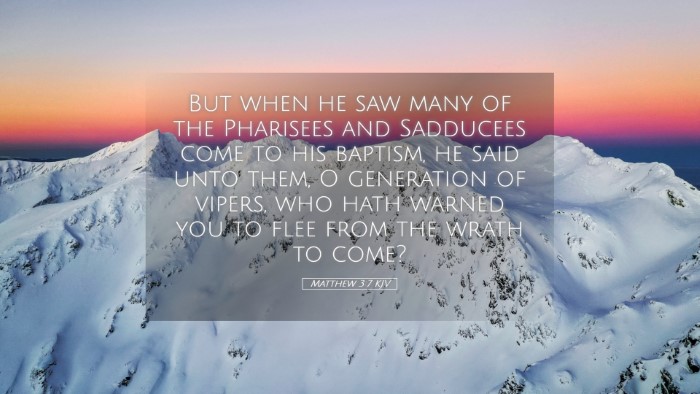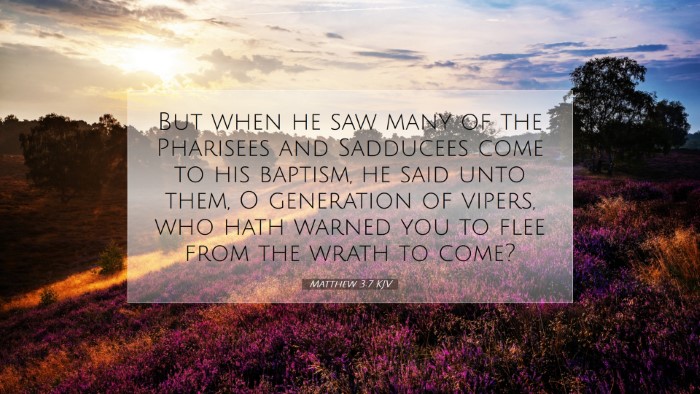Commentary on Matthew 3:7
Verse Context: Matthew 3:7 states, "But when he saw many of the Pharisees and Sadducees coming to his baptism, he said unto them, O generation of vipers, who hath warned you to flee from the wrath to come?" This verse is part of the account of John the Baptist’s ministry, emphasizing his role as the forerunner to Christ and his bold proclamation of repentance.
Understanding the Pharisees and Sadducees
Historical Significance: The Pharisees and Sadducees were two prominent Jewish sects during the time of Jesus. The Pharisees were known for their strict adherence to the law and oral traditions, while the Sadducees were more aristocratic and denied the resurrection. Their coming to John’s baptism signals a significant interaction and is a precursor to Jesus’s confrontation with the religious authorities.
Key Themes from Commentaries
-
John’s Call to Repentance:
Matthew Henry notes that John's ministry was rooted in a call to repentance, emphasizing that true repentance must come from the heart. He viewed the baptism as a sign of one’s commitment to change, not merely an outward ritual.
-
Confrontation with the Religious Leaders:
Albert Barnes highlights that John's address to the Pharisees and Sadducees reveals his boldness and prophetic role. He identifies them as a "generation of vipers," a strong denunciation implying deceitfulness and danger. This phrase serves as a warning about the insincerity often present in religious observance without real transformation.
-
The Concept of 'Wrath to Come':
Adam Clarke explains that the "wrath to come" refers to divine judgment. John emphasizes that mere ancestry or religious heritage is insufficient for salvation; rather, an authentic relationship with God is essential. This theological stance reinforces the need for genuine faith over mere tradition.
Theological Implications
The interaction between John the Baptist and the religious leaders has profound implications for theological discourse:
-
Authenticity in Worship:
There is a call for authenticity in worship and action. Religious leaders must ensure that their lives reflect the repentance they preach, a theme echoed in both Henry and Barnes’s commentaries.
-
The Nature of Repentance:
John’s ministry points to a deeper understanding of repentance—not just a change of mind but a total transformation of life, a concept emphasized in various biblical texts.
-
Judgment and Mercy:
The balance of judgment and mercy is prevalent throughout biblical text. John's harsh words serve as a necessary wake-up call for those who believe that their status alone can save them.
Practical Applications for Today
For Pastors and Theologians: The passage serves as an urgent reminder of the need for integrity in leadership. Pastors must model genuine repentance and teach their congregations about the reality of divine judgment balanced with grace.
For Students of the Scriptures: Students are encouraged to examine their own faith and relationship with God, reflecting on the sincerity of their devotion and understanding of true repentance.
For All Believers: The call to flee from wrath remains relevant; it is an invitation to a transformative relationship with Christ that transcends mere external ritual. Believers are urged to seek tangible evidence of their faith in their lives.
Conclusion
In summary, Matthew 3:7 serves as a critical point in the narrative of redemption. John’s confrontation with the religious leaders lays the groundwork for the ministry of Jesus, emphasizing that true faith is characterized by authenticity, a heart of repentance, and active engagement in the community of believers.


